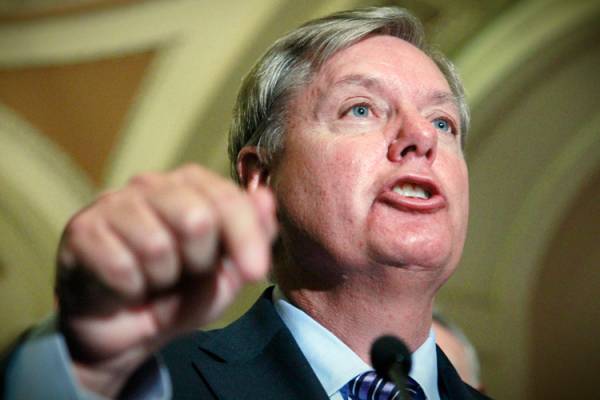Internet Gambling Control Act of 2014 Introduced by Graham, Chaffetz

South Carolina Republican Senator Lindsey Graham and Representative Jason Chaffetz, a Republican from Utah, introduced the Internet Gambling Control Act of 2014 Wednesday morning. It is a measure that would prohibit all forms of Web gambling in the US at the federal level while enforcing state governments to cease offering the activity as well.
“Because of the Obama administration’s decision virtually every cell phone or computer can again become a video poker machine,” Graham said during his news conference. “It’s simply not right.”
Graham's bill would outlaw online gambling in states where the activity is already legal such as Nevada, New Jersey and Delaware.
Those states would need to come to Congress for permission to continue that arrangement, the lawmakers said.
Those in opposition to Graham's measure were quick to react.
“It’s really simple. This ban on all Internet gaming would make American families and consumers less safe online,” said Mary Bono, a Republican former House member from California who is chairwoman of the Coalition for Consumer and Online Protection.
“There isn’t any question whether Americans are gaming online. They are,” Bono said. “Congress should be focused on keeping them safe, not shutting down existing consumer protections.”
The draft legislation prompted the Democratic Governors Association to write a letter condemning both elected officials for their failure in considering the importance of preserving state rights.
The bill is being pushed by anti-online gambling zealot and big time GOP donor Sheldon Adelson.
An excerpt from the Governors letter reads:
As you are aware, the regulation of gaming has traditionally been addressed by the states. As you consider the issue of Internet gaming, we hope you give strong consideration to the importance of preserving these state rights. Some states have chosen not to allow and regulate gaming; and for the many states that do allow it, gaming and lotteries are critical to producing the revenue needed to fund important state and local governmental services, such as public education. If enacted, not only would this Bill ban all forms of regulated internet gaming and internet lottery sales, but it would also have the effect of prohibiting the operation of traditional lottery draw games, including Mega Millions and Powerball, currently offered in forty-four states and the District of Columbia, Puerto Rico, and the U.S. Virgin Islands. This Bill would amend the “Wire Act” (18 U.S.C. §§ 1081 and 1084.5) to define “sporting event or contest” so broadly that it would prohibit all internet, mobile and telephonic gaming in the United States with the exception of horse racing and participation in fantasy sports tournaments as set forth in the Unlawful Internet Gambling Enforcement Act of 2006 (“UIGEA”).”
In some ways, movement on the Web gambling prohibition front is giving us a glimpse into potential GOP 2016 US Presidential hopefuls as Adelson has promised to finance the campaign of whomever he deems the most “promising” candidate. This backing will most certainly include a stipulation to support Adelson’s pet project of online gambling prohibition. Make no mistake about it, this matter ranks tops on his list of agendas (as if there weren’t more pressing issues to contend with).
Likely candidate Texas Republican Governor Rick Perry spoke out on the subject Tuesday, suggesting there needs to be a “time out” for online gambling legalization.
"Congress needs to step in now and call a 'time-out' by restoring the decades-long interpretation of the Wire Act," Perry wrote in the letter.
"When gambling occurs in the virtual world, the ability of states to determine whether the activity should be available to its citizens and under what conditions ... is left subject to the vaguaries of the technological marketplace," he said.
South Carolina Republican Governor Nikky Haley also came out swinging against legalized Internet gambling.
“Allowing Internet gaming to invade the homes of every American family, and to be piped into our dens, living rooms, workplaces, and even our kids’ bedrooms and dorm rooms, is a major decision. We must carefully examine the short and long-term social and economic consequences before Internet gambling spreads,” Haley said in the letter.
But not all potential GOP Presidential candidates are likely to bow to Adelson.
New Jersey Governor Chris Christie, up until recently considered the front runner in the upcoming US Presidential race before a statewide scandal knocked some wind out of his sails, is one of three governors who legalized real money Web gambling in their respective states.
Another likely GOP candidate, Kentucky Senator Rand Paul, is a strong advocate of state rights. His father, Ron Paul, while a Congressman, helped draft legislation that would have legalized online gambling at the federal level.
While it’s been noted that Chaffetz in the past has spoken out against legalizing virtual gambling, this is the first we are hearing from Graham on the subject. Some speculate it could have to do with a recent campaign contribution by Adelson in the form of a $15,600 check.
- Chris Costigan, Gambling911.com Publisher














